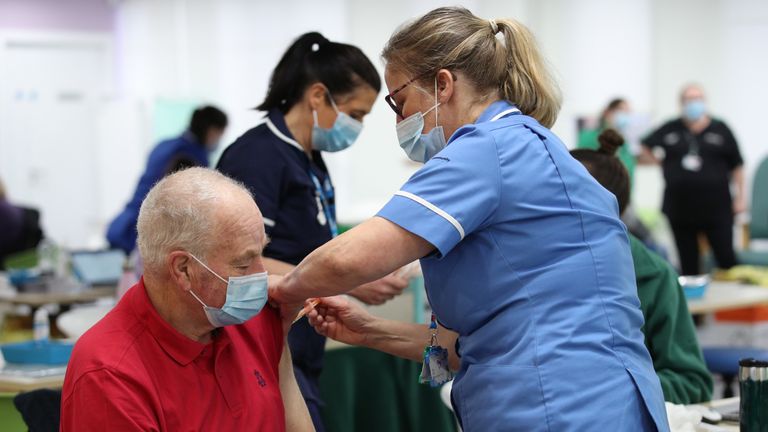COVID-19: Two doses of Pfizer or Oxford vaccine reduce risk of transmission by more than half, study shows
Research showed that people living with vaccinated NHS workers were between 30 and 54% less likely to get the virus.
Friday 12 March 2021 20:53, UK
Two doses of the Pfizer or Oxford vaccine reduces the risk of passing on COVID by more than half, a new study shows.
Researchers in Scotland found that people living with health workers who had been given one dose of a coronavirus vaccine were 30% less likely to get it themselves.
The same study found that households of health workers who had received both doses were 54% less likely to contract the virus.
The findings are the first in the UK to provide direct evidence that COVID-19 vaccines not only prevent severe disease and death - but also transmission.
Experts from Public Health Scotland and the University of Glasgow who carried out the research noted that both are low estimates - as household members could still have contracted the virus from elsewhere.
They carried out the study on 300,000 NHS workers and their households between 8 December - when the first vaccines were given out in Scotland - and 3 March.
Dr Dianne Stockton, the Public Health Scotland lead for the coronavirus vaccination surveillance programme, said the results are "encouraging", but stressed this should not make the public complacent.
"Despite this good news, it is important to remember that infection prevention and control practices in healthcare settings remain of paramount importance, as do the mitigations to prevent spread in our daily lives," she said.
She added that the risk of transmission did not go down to zero after individual healthcare workers were vaccinated.
Dr David McAllister, of Glasgow University, said: "Our study has important implications for informing vaccination strategies.
"The Joint Committee on Vaccination and Immunisation in the United Kingdom recently commented on the lack of real-world evidence evaluating the role of vaccination programmes on transmission.
Subscribe to the Daily podcast on , , ,
"We provide the first direct evidence that vaccinating individuals working in high-exposure settings reduces the risk to their close contacts - members of their households."
The UK vaccination programme is set to get a boost next week, with staff on standby to go to "maximum capacity" and administer twice as many jabs as they have been.
It comes as supplies increase, raising hopes that the target of having every adult vaccinated by the end of July could arrive sooner.
The latest figures show that 23,053,716 people in the UK have now received a first dose.
That is the equivalent of 43.8% of people aged 18 and over.



